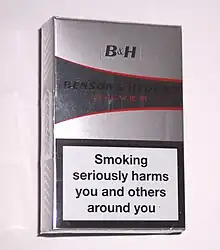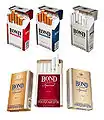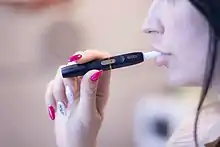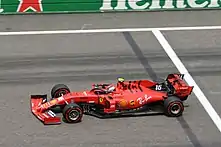Philip Morris International
Philip Morris International Inc. (PMI) is an American multinational tobacco company, with products sold in over 180 countries. The most recognized and best selling product of the company is Marlboro.[4] Philip Morris International is often referred to as one of the companies comprising Big Tobacco.
 | |
 PMI operations center in Lausanne | |
| Type | Public |
|---|---|
| Industry | Tobacco |
| Founded |
|
| Founder | Philip Morris |
| Headquarters |
|
Area served | Worldwide (excluding the U.S.) |
Key people | André Calantzopoulos (Executive Chairman) Jacek Olczak (CEO) |
| Products | Cigarettes, cigarillos, cigars, electronic cigarettes, heated tobacco products, nicotine pouches, snus, |
| Brands | Iqos, L&M, Marlboro, Zyn |
| Revenue | |
| Total assets | |
| Total equity | |
Number of employees | 79,800 (2022)[1] |
| Subsidiaries | |
| Website | www |
| Footnotes / references [3] | |
Until spun off in March 2008, Philip Morris International was an operating company of Altria. Altria explained the spin-off, arguing PMI would have more "freedom," i.e. leeway outside the responsibilities and standards of American corporate ownership in terms of potential litigation and legislative restrictions to "pursue sales growth in emerging markets", while Altria focuses on the American domestic market.[5] The shareholders in Altria at the time were given shares in PMI, which was listed on the London Stock Exchange and other markets.
The company's legal seat is in Stamford, Connecticut, but it does not operate in the United States of America. Philip Morris USA, a subsidiary of PMI's former owner American parent Altria group, owns the Philip Morris brands there. PMI's operational headquarters are in Lausanne, Switzerland.[6]
With tobacco being addictive and the single greatest cause of preventable death globally,[7] the company is highly controversial, not least because of its history of obfuscating scientific evidence around the health impacts of smoking. It has been the subject of litigation and restrictive legislation from governments.
The company ranked No. 101 in the 2021 Fortune 500 list of the largest corporations by total revenue.[8]
History
Early development
The company states its history is traced to a British tobacconist, Philip Morris, opening a single shop on London's Bond Street in 1847 which sold tobacco and cigarettes.[9][10] In 1881, Philip Morris' son, Leopold Morris, established "Philip Morris & Company and Grunebaum Ltd" with Joseph Grunebaum.[4] In 1885, the company changed its name to "Philip Morris & Co. Ltd."[4]
In 1894, William Curtis Thomson and his family began to control the company, and in 1902 the company was incorporated in New York.[4] In 1919, the American business was acquired and incorporated as "Philip Morris & Co. Ltd., Inc." in Virginia.[4]
Later development
In 1954, Philip Morris (Australia) became the first affiliate of Philip Morris & Co., Ltd, Inc. outside the U.S. In 1972, the company's Marlboro became the world's top-selling cigarette brand.[4]
In 1987, Philip Morris International (PMI) was incorporated as an operating company of Philip Morris Companies Inc.[4] In 2001, the operations center of the company was transferred from Rye Brook, New York, to Lausanne, Switzerland.[4][11] On January 27, 2003, Philip Morris Companies Inc. formally changed its name to the Altria Group.[12] In March 2008, Philip Morris International was spun off from Altria.[13]
In April 2014, Philip Morris International announced that it would close its Moorabbin plant in Australia by the end of 2014 after operating for 60 years, due to the gradual decline of sales in the last ten years and difficulties conforming to 2010 Australian government regulation about reducing fire risks.[14] In 2015, the company sold 850 billion cigarettes.[15]
In August 2018 Reuters reported that Philip Morris "has been among foreign companies with exposure to Russia’s tobacco market. The company’s sales exposure to Russia is 7 percent, according to a note from Goldman Sachs."[16]
As of 2019, main institutional investors are The Vanguard Group with an 8% stake, Capital Research & Management with 5% and BlackRock Fund Advisors with 4%.[17]
In July 2021, Philip Morris International agreed to buy Vectura for £1 billion.[18]
In November 2021, Philip Morris International announced the relocation of its corporate headquarters from New York to Stamford, Connecticut, which expected to take effect in Summer 2022, while its operational center remained in Lausanne.[19]
In 2022, due to the Russian invasion of Ukraine and boycott of the Russian market by many international companies, the company has faced trouble due to its high level of exposure to the Russian market, from which it was reluctant to disinvest.[20][21][22] On the same year, PMI has agreed to a $16 billion deal with Swedish Match which would boost its position in cigarette alternatives.[23]
Brands
Philip Morris International has six multibillion US$ brands including:
- Dji Sam Soe 234 was launched in 1913 and is a brand of kretek cigarettes. It is the best seller of kretek cigarettes in Indonesia.
- L&M was launched by Liggett & Myers in 1953 with the tagline: "American cigarettes of the highest quality with the best filter." L&M variants include full flavor shorts, full flavor 100s, lights, ultra lights, menthol shorts, menthol 100s, menthol light shorts, menthol light 100s, Turkish Blend shorts, Turkish Blend 100s, and L&M Mild Kretek.
- Longbeach include in Australia and Indonesia in 1999. Longbeach variant include: Longbeach Filter and Longbeach Mild.
- Marlboro was launched in 1904. Marlboro is the premium brand. Marlboro variants include: Marlboro Special, Marlboro Menthol, Marlboro Lights, Marlboro Lights Menthol, Marlboro Mix-9 Filter Kretek, Marlboro Flavor Plus, Marlboro Black Menthol, and Heatsticks, a heated tobacco product.[24] The company's Marlboro brand ranked first among the most valuable tobacco brands of 2017 on BrandFinance's website,[25] which uses the royalty relief method of brand valuation.[26]
- ST Dupont Paris is the brand cigarette designed by Simon Tissot Dupont in 1902. With the black packaging. ST Dupont Paris variants include: filter, lights, menthol, and menthol lights.
- A Mild or Sampoerna A was launched in Indonesia on 1989. A Mild is a mild kretek cigarette sold in Indonesia. The iconic brands and best selling brand from Indonesia, now sold in Malaysia.
- Chesterfield was launched in 1896. Chesterfield is the third-largest international brand from Philip Morris, with a volume of 57 Billion cigarettes in 2019.
- Philip Morris is the fourth-largest international brand from Philip Morris, with a volume of 49 Billion cigarettes in 2019 and is sold in over 40 markets.




 Dji Sam Soe 234
Dji Sam Soe 234.jpg.webp)
.jpg.webp)
 Longbeach
Longbeach Marlboro
Marlboro Marlboro Ice Blast
Marlboro Ice Blast

Board of directors
As of October, 2023:[27]
- Bonin Bough
- Michel Combes
- André Calantzopoulos – Chairman
- Juan José Daboub
- Werner Geissler
- Lisa Hook
- Jun Makihara
- Kalpana Morparia
- Robert B. Polet
- Jacek Olczak
- Dessi Temperley
- Shlomo Yanai
Finances
For the fiscal year 2022 Philip Morris reported earnings of US$9.048 billion with an annual revenue of US$80.669 billion, a decrease of 1.9% over the previous fiscal cycle.[1][28] Its shares traded at $101.21 per share as of December 31, 2022, and its market capitalization was valued at over US$150 billion at the end of the fiscal year 2022.[29]
| Year | Revenue in mil. US$[28] |
Net income in mil. US$[28] |
Total Assets in mil. US$[31] |
Price per Share in US$ |
Employees[28] |
|---|---|---|---|---|---|
| 2005 | 45,316 | 5,616 | |||
| 2006 | 48,302 | 6,130 | |||
| 2007 | 55,243 | 6,038 | 31,777 | ||
| 2008 | 63,640 | 6,890 | 32,972 | 43.51 | 75,600 |
| 2009 | 62,080 | 6,342 | 34,552 | 48.19 | 77,300 |
| 2010 | 67,713 | 7,259 | 35,050 | 58.53 | 78,300 |
| 2011 | 76,346 | 8,591 | 35,488 | 78.48 | 78,100 |
| 2012 | 77,393 | 8,800 | 37,670 | 83.64 | 87,100 |
| 2013 | 80,028 | 8,576 | 38,168 | 87.13 | 91,100 |
| 2014 | 80,106 | 7,459 | 35,187 | 81.45 | 82,500 |
| 2015 | 73,908 | 6,849 | 33,956 | 87.91 | 80,200 |
| 2016 | 74,953 | 6,948 | 36,851 | 91.49 | 79,500 |
| 2017 | 78,098 | 6,021 | 42,968 | 105.65 | 80,600 |
| 2018 | 79,823 | 7,911 | 39,801 | 66.76 | 77,400 |
| 2019 | 77,921 | 7,185 | 42,875 | 85.09 | 73,500 |
| 2020 | 76,047 | 8,056 | 44,815 | 82.79 | 71,000 |
| 2021 | 82,223 | 9,109 | 41,290 | 95.00 | 69,600 |
| 2022 | 80,669 | 9,048 | 61,681 | 101.21 | 79,800 |
Carbon footprint
Philip Morris International reported Total CO2e emissions (Direct + Indirect) for the twelve months ending 31 December 2020 at 492 Kt (-175 /-26.2% y-o-y)[32] and commits to reduce absolute emissions 50% by 2030 from a 2019 base year.[33] This science-based target is aligned with Paris Agreement to limit global warming to 1.5 °C above pre-industrial levels.[34]
| Dec 2015 | Dec 2016 | Dec 2017 | Dec 2018 | Dec 2019 | Dec 2020 |
|---|---|---|---|---|---|
| 811[35] | 788[36] | 749[37] | 699[38] | 667[39] | 492[32] |
Research
Philip Morris International's research center is located in Neuchatel, Switzerland and houses Philip Morris International's product research and development program.[40] As of April 2018, earnings reports showed the company had spent $4.5 billion on four products: two that heat rather than burn tobacco, and two other nicotine products.[41] One of these heat-not-burn tobacco products is IQOS.[42]
Controversies
Foundation for a Smoke-free World
In September 2017, Philip Morris International announced the establishment of the Foundation for a Smoke-Free World, stating that it would support it with almost US$1 billion of funding over the next 12 years.[43] The declared objective of the Foundation was to "evaluate the impact that smoke-free alternatives can have on smokers and public health, assess the effect of reduced cigarette consumption on the industry value chain, and measure overall progress towards a smoke-free world."[43] However, the Foundation, which claimed to be independent, was surrounded with controversy since its inception.[44][45] Its claims to independence have been challenged.[46][44][47]
The World Health Organization issued a statement in which it pointed out the "conflicts of interest involved with a tobacco company funding a purported health foundation", indicating that it would not partner with the Foundation and inviting governments and the public health community to follow its lead.[48] More than one hundred public health organizations have taken a strong stance in rejecting collaboration with the foundation.[45][49]
Australia
The Australian Government announced it would introduce "Tobacco Plain Packaging Laws" on 29 April 2010. Philip Morris International (PMI), arranged for its wholly owned Hong Kong subsidiary Philip Morris Asia (PMA) to 'takeover' two Australian subsidiaries – Philip Morris Australia Limited and Philip Morris Limited on 23 February 2011. In June 2011, Philip Morris International announced that it was using ISDS provisions in the Australia-Hong Kong Bilateral Investment treaty (BIT) to demand compensation for Australia's plain cigarette packaging anti-smoking legislation.[50] It was one of several tobacco companies to launch legal action against the Australian Government.[51] In response, British American Tobacco, Philip Morris, Imperial Tobacco and Japan Tobacco International took the Australian government to the High Court of Australia to try to stop the government of Australia from introducing plain packaging for tobacco products.
Two challenges to the tobacco plain packaging legislation were heard by the High Court of Australia between 17 and 19 April 2012: 'British American Tobacco Australasia Limited and Ors v. Commonwealth of Australia' and 'J T International SA v. Commonwealth of Australia'.
On 15 August 2012, the High Court handed down orders for these matters, and found that the Tobacco Plain Packaging Act 2011 is not contrary to s 51(xxxi) of the Constitution. On 5 October 2012, the Court handed down its reasons for the decision. By a 6:1 majority (Heydon J in dissent) the Court held that there had been no acquisition of property that would have required provision of 'just terms' under s51(xxxi) of the Constitution.[52]
On 18 December 2015, the Tribunal instituted by the United Nations Commission on International Trade Law (UNCITRAL) issued a unanimous decision (3–0) agreeing with Australia's position that the Tribunal has no jurisdiction to hear PMA's claim. This was due to the fact that PMI used its wholly owned subsidiary PMA to takeover the Australian-based PM subsidiaries in order to specifically sue the Australian Government for bringing in plain packaging laws. PMI was unable to do this itself as the Australia–United States free-trade agreement signed in 2004 did not have any investor-state dispute settlement clauses included—by design.[52]
In 2017, the Dispute Settlement Body of the World Trade Organization supported Australia's right to enforce plain packaging.[53] In 2017, PMI was instructed to pay the Australia government's legal costs, an estimated 50 million dollars.[54]
In March 2018, the Tobacco giant announced that it will cut 150 jobs as part of a major restructure. Tammy Chan, the managing director in Australia, said more efficient ways to deal with retailers were introduced based on digital technology development.[55]
European Union
In 2004, Philip Morris and the European Union reached an agreement according to which Philip Morris would pay $1.25bn until 2016 to end a lawsuit over smuggling charges.[56]
Norway
Philip Morris also sued Norway over the country's ban on displaying tobacco products in stores. It lost the case in 2012.[57]
Uruguay
In 2010, the company lobbied against Uruguay's strong anti-smoking laws[58] and filed a complaint against the country (Philip Morris v. Uruguay) under the Switzerland-Uruguay bilateral investment treaty.[59] On 8 July 2016, the International Centre for Settlement of Investment Disputes ruled in favour of Uruguay.[60]
United Kingdom
In August 2014, the company foreshadowed legal action against the Government of the United Kingdom if it went ahead with plans to introduce plain packaging. In a submission to the government, Philip Morris International said it would seek compensation running into "billions of pounds," if the proposed legislation went ahead.[61]
In 2018, an advertising campaign was criticized as hypocritical for urging smokers to quit while promoting other products such as heated tobacco.[62]
IQOS

In 2017, according to two editors of the journal JAMA Internal Medicine, after publication of a research letter describing harmful chemicals in heat-not-burn tobacco products, people from Philip Morris International contacted the institutions where the researchers worked and questioned the methods used in the study; the editors described this as a form of "pressure to suppress discourse that could harm commercial interests".[63]
In December 2017, Reuters published documents and testimonies of former employees detailing irregularities in the clinical trials conducted by Philip Morris International for the approval of the IQOS product by the FDA.[64]
In October 2020, Philip Morris launched its IQOS products in the UAE. The country had officially legalised the sale and use of electronic cigarettes in April 2019. The U.S. Food and Drug Administration (FDA) authorised the marketing of IQOS system, which includes IQOS devices and 3 HeatSticks variants, as a modified risk tobacco product (MRTP) in July 2020. IQOS is the first electronic alternative to cigarettes to be granted marketing orders through the FDA's MRTP process.[65]
Cigarette smuggling in Africa
According to the Organized Crime and Corruption Reporting Project (OCCRP), Philip Morris' representative in Burkina Faso, Apollinaire Compaoré, has earned millions by participating in cigarette smuggling in West Africa. In particular, he worked with a Nigerian narco-trafficker Chérif Ould Abidine, nicknamed Chérif Cocaine, to smuggle Marlboro cigarettes into Libya. This tobacco trafficking contributes to the financing of local conflicts and passes through six countries: Algeria, Libya, Burkina Faso, Mali, Niger and Côte d'Ivoire.[66]
Other
From the 1970s to the late 1990s, Phillip Morris along with British American Tobacco, was involved in campaigns to undermine bans against smoking in Muslim majority countries by branding Muslims who opposed smoking as a "'fundamentalist’ who wishes to return to sharia law," and be "a threat to existing government as” according to leaked documents.[67] A 1985 report from Philip Morris squarely blamed the World Health Organization: “This ideological development has become a threat to our business because of the interference of the WHO [...] The WHO has not only joined forces with Muslim fundamentalists who view smoking as evil, but has gone yet further by encouraging religious leaders previously not active anti-smokers to take up the cause."[67] Philip Morris has refused to comment on these findings.[67]
Philip Morris International has announced an overhaul of its human rights protections of tobacco workers in Kazakhstan and 30 other countries after critical reports.[68]
The company runs an information web site outlining the health issues of tobacco. However, it has been criticised in an article in the journal Public Health Nursing as merely a "public relations effort" intended to "undermine public health".[69]
In the 1930s, the company's tobacco advertisements were a steady source of income for numerous medical organizations and journals, including the New England Journal of Medicine (NEJM) and the Journal of the American Medical Association (JAMA).[70]
In February 2015, John Oliver highlighted the company's many international legal cases on an episode of his television show Last Week Tonight. He also attempted to raise awareness for his campaign using the hashtag #JeffWeCan.[71]
Sponsorship
Philip Morris is a long-term main sponsor of the Formula One team Scuderia Ferrari.[72] The sponsorship is subliminal in the logo in recent times due to restrictions in tobacco advertising. Marlboro-branded Ferrari and McLaren cars won several world titles with famous drivers such as Alain Prost, James Hunt, Niki Lauda, Ayrton Senna and Michael Schumacher. Philip Morris also sponsored several title winners in MotoGP, road racing and Indy Cars. The Ferrari Formula One deal before direct advertisements were banned was estimated to be worth £45 million a year as well as paying the multi-million salary of Schumacher.[73]
Despite no longer being able to display the Marlboro logo on Ferrari cars, Philip Morris renewed its sponsorship deal with Ferrari in 2011,[74] 2015,[75] 2017,[76] and 2018 up until 2021.[77] The 2017 deal was reported to be worth $160 million a year.[78]
Philip Morris's sponsorship of Ferrari was seen visually on the car again at the 2018 Japanese Grand Prix, with the cigarette company's "Mission Winnow" branding. This branding has been seen by authorities as an attempt to flout laws and rules banning tobacco advertising, and it was removed by Ferrari for the 2019 Australian Grand Prix after Australian authorities launched an investigation.[79] Ferrari also decided to remove the branding for the 2019 Canadian Grand Prix and the 2019 French Grand Prix to avoid problems with bans on tobacco advertising.[79] As of 2022, Mission Winnow/Phillip Morris International and Ferrari have decided to mutually end their title sponsorship and sponsorship agreement entirely.

In motorcycle racing, Philip Morris International sponsored Ducati Corse and Yamaha MotoGP teams. In 1999, Yamaha was sponsored by Marlboro until 2002 season of MotoGP series. In 2003, Marlboro has been a title sponsor of the team despite the company logo does not appear or riders motorcycle due to the tobacco advertising ban in European Union countries that were already in effect at that time.[80] similarly it had been removed from Scuderia Ferrari Formula One race cars earlier in 2019.[81][82] Marlboro would stopped the sponsorship on Ducati in 2007. During the Marlboro sponsorship period, Yamaha won the constructor championship in 2000 season and Ducati won the constructor title in 2007 season with Casey Stoner as rider champion.
In 2019, similar to Scuderia Ferrari Formula One team, Philip Morris International returned as a sponsor for Ducati MotoGP team with the cigarette company's "Mission Winnow" branding. The sponsorship has raised controversy in some countries like Australia and Italy. The case has been brought to Italian court. However, Philip Morris International spokesperson, Tomasso di Giovanni denied Mission Winnow being a tobacco advertising and instead is a company dedicated to developing and find ways to help smokers around the world to give up their tobacco addiction. The Australian federal Minister for Health and Victoria state Department of Health and Human Services has also launched a probe against Philip Morris International.[83] Mission Winnow was forced to drop its branding during the 2019 French motorcycle Grand Prix in Le Mans and 2019 Australian Motorcycle Grand Prix in Phillip Island, Victoria due to local government regulations.[84] By 2020 season, Mission Winnow has been dropped as Ducati main sponsor and has been replaced with Lenovo to fill the main sponsorship void.
References
- "Philip Morris International Inc. 2022 Annual Report" (PDF). PMI. 31 December 2022.
- "Philip Morris International Balance Sheet". PMI.com.
- "US SEC: Form 10-K Philip Morris International Inc" (PDF). United States Securities and Exchange Commission. Retrieved 28 March 2018.
- "Key Milestones". www.pmi.com. Retrieved 20 July 2018.
- "Altria to spin off Philip Morris International". NBC News. AP. 29 August 2007. Retrieved 19 December 2011.
- "About us". www.pmi.com. Retrieved 8 May 2020.
- WHO Report on the Global Tobacco Epidemic, 2008: the MPOWER package (PDF). Geneva: World Health Organization. 2008. ISBN 978-92-4-159628-2. Archived from the original (PDF) on 8 March 2008.
- "Philip Morris International". Fortune. Retrieved 5 August 2021.
- "Philip Morris Companies Inc. – Company Profile, Information, Business Description, History, Background Information on Philip Morris Companies Inc". www.referenceforbusiness.com. Retrieved 30 March 2018.
- "Philip Morris International on the Forbes Global 2000 List". Forbes. Retrieved 20 July 2018.
- "Where to find us." Philip Morris International. Retrieved on 19 October 2009.
- Smith, Elizabeth A.; Malone, Ruth E. (April 2003). "Altria Means Tobacco: Philip Morris's Identity Crisis". American Journal of Public Health. 93 (4): 553–556. doi:10.2105/AJPH.93.4.553. ISSN 0090-0036. PMC 1447789. PMID 12660196.
- "Altria - Investors - Press Release". investor.altria.com. Archived from the original on 5 January 2017. Retrieved 20 July 2018.
- Michael Janda (2 April 2014). "Philip Morris to quit Australian cigarette manufacturing". Australian Broadcasting Corporation. Retrieved 9 September 2014.
- "Cigarettes: Smoke signals". The Economist. 23 April 2016.
- "Factbox: U.S. companies with exposure to Russia". Reuters. 9 August 2018.
- "Philip Morris International information". CNN Business. Retrieved 24 April 2020.
- Ralph, Alex (9 July 2021). "Philip Morris buys respiratory drugs company Vectura for £1bn". The Times. ISSN 0140-0460. Retrieved 9 July 2021.
- "Philip Morris International announces new Corporate Headquarters will be located in Stamford, Connecticut". 9 November 2021. Retrieved 17 May 2022.
- Gapper, John (18 March 2022). "Big Tobacco's future in Russia goes up in smoke". Financial Times. Retrieved 23 March 2022.
- "Philip Morris suspends investments in Russia, scales back manufacturing". Reuters. 9 March 2022. Retrieved 23 March 2022.
- Escobar, Sabrina. "Philip Morris Stock Tumbles. It Has Too Much Exposure to Russia and Ukraine". www.barrons.com. Retrieved 23 March 2022.
- Ringstrom, Anna (11 May 2022). "Philip Morris bets on cigarette alternatives with $16 bln Swedish Match bid". Reuters. Retrieved 11 May 2022.
- Felberbaum, Michael (26 June 2014). "Philip Morris Int'l to Sell Marlboro HeatSticks". Richmond, Virginia: ABC News. AP. Retrieved 28 June 2014.
- "Best Global Brands | Brand Profiles & Valuations of the World's Top Brands". brandirectory.com. Retrieved 30 March 2018.
- "Explanation of the Methodology". brandirectory.com. Retrieved 18 January 2019.
- "Board of Directors". pmi.com. Retrieved 2 October 2023.
- "Reports & Filings". www.pmi.com.
- "Philip Morris International Market Cap". ycharts.com.
- "Philip Morris International - Assets". Wall Street Journal.
- "Philip Morris International's Annual Report for 2020Q4" (PDF). Archived from the original (PDF) on 24 June 2021. Alt URL
- "Accelerating our action on climate change". www.pmi.com.
- "Companies taking action". Science Based Targets.
- "Philip Morris International's Annual Report for 2017Q4" (PDF). Archived from the original (PDF) on 14 September 2021. Alt URL
- "Philip Morris International's Annual Report for 2018Q4" (PDF). Archived from the original (PDF) on 14 September 2021. Alt URL
- "Philip Morris International's Annual Report for 2019Q4" (PDF). Archived from the original (PDF) on 21 January 2021. Alt URL
- "Philip Morris International's Annual Report for 2020Q4" (PDF). Archived from the original (PDF) on 24 June 2021. Alt URL
- "Philip Morris International's Annual Report for 2020Q4" (PDF). Archived from the original (PDF) on 24 June 2021. Alt URL
- "Philip Morris International Bets Big on the Future of Smoking". Forbes. Retrieved 14 August 2018.
- "Philip Morris Plunges the Most in a Decade on Slump in Cigarettes". Bloomberg. Retrieved 14 August 2018.
- Lasseter, Tom; Bansal, Paritosh; Wilson, Thomas; Miyazaki, Ami; Wilson, Duff; Kalra, Aditya (20 December 2017). "Scientists describe problems in Philip Morris e-cigarette experiments". Reuters. Retrieved 30 March 2018.
- "Philip Morris International Announces Support for the Establishment of the Foundation for a Smoke-Free World". Philip Morris International. 2017.
- Boseley, Sarah (13 September 2017). "Tobacco company launches foundation to stub out smoking". The Guardian.
- Tess, Legg; Peeters, Silvy; Chamberlain, Phil; Gilmore, Anna (6 June 2019). "The Philip Morris-funded Foundation for a Smoke-Free World: tax return sheds light on funding activities". Lancet. 393 (10190): 2487–2488. doi:10.1016/S0140-6736(19)31347-9. PMID 31178156.
- van der Eijk, Yvette; Bero, Lisa A.; Malone, Ruth E. (21 September 2018). "Philip Morris International-funded 'Foundation for a Smoke-Free World': analysing its claims of independence". Tobacco Control. 28 (6): 712–718. doi:10.1136/tobaccocontrol-2018-054278. ISSN 1468-3318. PMID 30242044. S2CID 52313085.
- Daube, Mike; Moodie, Rob; McKee, Martin (14 October 2017). "Towards a smoke-free world? Philip Morris International's new Foundation is not credible". Lancet. 390 (10104): 1722–1724. doi:10.1016/S0140-6736(17)32561-8. ISSN 1474-547X. PMID 29047432. S2CID 27725280.
- "WHO Statement on Philip Morris funded Foundation for a Smoke-Free World". 28 September 2017.
- "Open Letter to Urge WHO Executive Board to Reject Foundation for a Smoke Free World (FSFW) (2019)". 28 January 2019.
- Klya Tienhaara and Thomas Faunce Gillard Must Repel Big Tobacco's Latest Attack. Archived 7 August 2011 at the Wayback Machine Canberra Times 28 June 2011
- "Plain packaging challenge faces High Court". ABC News. 16 April 2012. Retrieved 12 July 2012.
- Australian Government Attorney-Generals Department Archived 29 November 2015 at the Wayback Machine, retrieved 20 December 2015
- "Australia wins landmark tobacco WTO packaging case, reports". The Sydney Morning Herald. 5 May 2017. Retrieved 9 July 2017.
- Gartrell, Adam (9 July 2017). "Philip Morris ordered to pay Australia millions in costs for plain packaging case". The Sydney Morning Herald. Retrieved 9 July 2017.
- Toscano, Nick (6 March 2018). "Cigarette giant Philip Morris slashes Australian workforce". Canberra Times. Retrieved 30 March 2018.
- Tran, Mark (9 July 2004). "Philip Morris reaches $1.25bn EU agreement". The Guardian. Retrieved 22 March 2018.
- "Norway: Prohibition on the visible display of tobacco products at the points of sale". WHO.
- Carroll, Rory (27 July 2010). "Uruguay bows to pressure over anti-smoking law amendments". The Guardian. Retrieved 9 July 2017.
- BBC (12 March 2010). "Tabacalera Philip Morris demanda a Uruguay" (in Spanish). Retrieved 15 November 2010.
- "Phillip Morris loses tough-on-tobacco lawsuit in Uruguay". Reuters. 8 July 2016. Retrieved 9 July 2016.
- "Plain cigarette packing plan sees Philips Morris threaten legal action". London Mercury. 12 August 2014. Retrieved 14 August 2014.
- Hope, Katie (22 October 2018). "Phillip Morris accused of hypocrisy over anti-smoking ad". BBC News. Retrieved 20 June 2019.
- Katz, MH; Redberg, RF (6 November 2017). "Science Requires Open Discourse". JAMA Internal Medicine. 178 (1): 15–16. doi:10.1001/jamainternmed.2017.5763. PMID 29114738.
- Lasseter, Tom; Bansal, Paritosh; Wilson, Thomas; Miyazaki, Ami; Wilson, Duff; Kalra, Aditya (20 December 2017). "Scientists describe problems in Philip Morris e-cigarette experiments". Reuters.
- "Philip Morris International unveils new IQOS Boutique at Dubai Mall". 7 October 2020.
- Mangal (CENOZO), Aisha Kehoe Down (OCCRP), Gaston Bonheur Sawadogo (CENOZO), Tom Stocks (OCCRP), Ramdane Guidiguoro (CENOZO), and Kétéri. "Marlboro's Man: Philip Morris' Representative in Burkina Faso is a Known Cigarette Smuggler". OCCRP. Retrieved 9 March 2021.
{{cite web}}: CS1 maint: multiple names: authors list (link) - Boseley, Sarah (20 April 2015). "How tobacco firms tried to undermine Muslim countries' smoking ban". The Guardian. Retrieved 5 February 2017.
- Philip Morris International Overhauls Labor Protections. Human Rights Watch, 22 May 2011.
- Elizabeth A. Smith and Ruth E. Malone, R.N., F.A.A.N. (2008), "Philip Morris's Health Information Web Site Appears Responsible but Undermines Public Health", Public Health Nursing, 25 (6): 554–64, doi:10.1111/j.1525-1446.2008.00743.x, PMC 2794243, PMID 18950420
{{citation}}: CS1 maint: multiple names: authors list (link) - Martha N. Gardner & Allan M. Brandt (2006), "The Doctors' Choice Is America's Choice", Am J Public Health, 96 (2): 222–32, doi:10.2105/AJPH.2005.066654, PMC 1470496, PMID 16434689
- "#jeffwecan Campaign Launch". John Oliver Last Week Tonight.
- "Philip Morris International". Scuderia Ferrari. Retrieved 30 March 2015.
- Day, Julia (23 February 2001). "Philip Morris strengthens Ferrari ties". The Guardian. Retrieved 31 March 2015.
- ESPN F1 Staff (14 June 2011). "Ferrari extends deal with tobacco company Philip Morris". Retrieved 12 June 2019.
- Pablo Elizalde (14 May 2015). "Philip Morris extends Ferrari deal". Retrieved 12 June 2019.
- Laurence Edmondson (4 September 2017). "Ferrari renews Philip Morris partnership". Retrieved 12 June 2019.
- "Philip Morris extend Ferrari sponsorship deal". 21 February 2018. Retrieved 12 June 2019.
- thejudge13 (12 December 2017). "Ferrari's Tobacco Money: A Return to Advertising on Cars?". Retrieved 12 June 2019.
- Scott Mitchell (28 May 2019). "Ferrari to replace Mission Winnow branding for Canadian, French GPs". Retrieved 12 June 2019.
- Dovizioso, Petrucci unveil Ducati livery for Le Mans livery crash.net, 16 May 2019. Retrieved 18 May 2019
- Ducati MotoGP team to ditch Mission Winnow branding for Le Mans Autosport, 9 May 2019. Retrieved 18 May 2019
- Ducati unveil one-off livery for Le Mans thecheckeredflag.co.uk, 16 May 2019. Retrieved 18 May 2019
- Gomes, Bruno (6 March 2019). "MotoGP – Sponsorship problems for the Mission Winnow Ducati team". iMotorcycle. Retrieved 10 April 2022.
- Klein, Jamie (9 May 2019). "Ducati to remove Mission Winnow branding for French GP". Motorsport.com. Retrieved 10 April 2022.
External links
- Business data for Philip Morris International:
- Official website
- "Morris study blasted: Commissioned study found smokers' early deaths helped Czech Republic". CNN Money (July 16, 2001).



